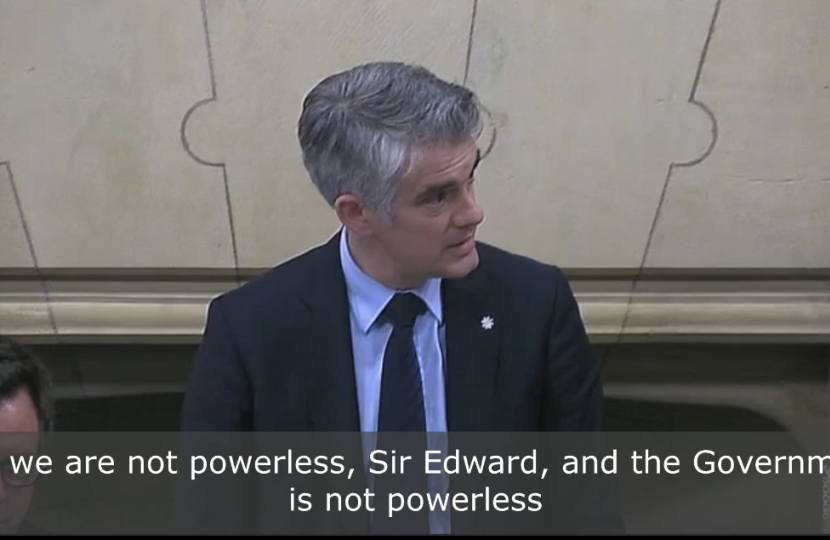
“Whenever a child is ill, we feel incredibly powerless, but we are not powerless and nor are the Government. We have the power to raise the priority of brain tumour research and I hope the Government do so”.
I spoke those words eight years ago today, on April 18th 2016, in a Parliamentary debate on ‘Brain Tumours’. The parents of Daisy Brooks from Bures, who lost her life so tragically to a rare brain tumour – Diffuse Midline Glioma (DMG) – were sitting in the public gallery, watching on.
As such, I was delighted when I recently received confirmation that breakthrough research into childhood cancer is now underway at Great Ormond Street Hospital (GOSH). A first-of-its-kind clinical trial into DMG - which has one of the worst survival rates for children - gives hope for a cure. I will never forget the emotion surrounding our Westminster Hall chamber as I spoke in that debate; I hope that this news means the great wish of all those supporting Daisy’s campaign will now transpire – that lasting good will come from her tragic story.
As one considers a life lost to ‘natural’ causes, though which we now hope to one day master, it puts into context the true horror of children taken by human hand – in war. Whether Ukraine or the Middle East, the senseless slaughter of all kinds – young and old; military and civilian – seems to continue unabated.
Despite the understandable sense that many readers will feel such conflicts seem far from resolution, once again, we are not powerless. We have spent over £100m supporting the Occupied Palestinian Territories this year, delivering a huge amount of aid into Gaza itself. In Ukraine, we have played a key role keeping its army in the fight. As Minister for Defence Procurement, I’ve been constantly taken aback by the sheer scale of ordnance that we have sent into theatre, and at great speed.
Yet our ‘power’ to act is limited. We require other nations to do their bit. In many ways, one of the biggest impacts that we have had on the effort to support Ukraine has been cohering other nations to donate significant resource themselves.
So, it should be a concern for us all when doubts are aired about the willingness of the international community to keep providing support to Ukraine. Lord Cameron, the Foreign Secretary, has been in the US seeking to persuade its political principals to provide another big round of support, together with our former Prime Minister, Boris Johnson – who rightly warned that conceding victory to Putin would be a “disaster for the west and a disaster for America”.
I focus on this issue because I cannot ignore the murmurings of those, at home and abroad, who want to see this democratic, illegally invaded nation, ‘negotiate with Putin’. I understand this to be Donald Trump’s position, though of course the identity of the next US President will be for the American people to decide. Yet some constituents have also suggested to me that they think Ukraine should concede territory and negotiate – this being the recently stated position of one Nigel Farage.
I fundamentally disagree. All history shows that you cannot trust dictators; that those who are prepared to take someone else’s land by force are unlikely to stop if you ask them nicely; that if you offer up territory - as we did with Czechoslovakia to Hitler - they will as likely just come back for more.
It is argued that Ukraine appear on the back-foot, and it’s time to ‘end the slaughter’. We can all agree with the latter sentiment, but we didn’t negotiate with Hitler in 1940 when all looked forlorn. We fought on. We knew we couldn’t trust the Nazi regime. If we continue to support Ukraine, it makes it less likely that Putin will turn his attention to NATO’s eastern flank, ultimately threatening us.
We cannot take our defence for granted, and I was proud that last week significant reform of defence procurement went live - which I have personally overseen. This is the MoD’s new ‘Integrated Procurement Model’, and its first output is a laser, ‘DragonFire’, giving our own armed forces extraordinary, cutting-edge capability.
Peace and compassion are the values that we must hold dear and are why so many have supported the Daisy campaign, inspired by wanting to help the most vulnerable. To sustain a society built on those values, rather than aggression and tyranny, we have to ultimately be able to defend ourselves, deter aggressors and support our allies. We cannot give up on Ukraine now.
Published in the Suffolk Free Press.

